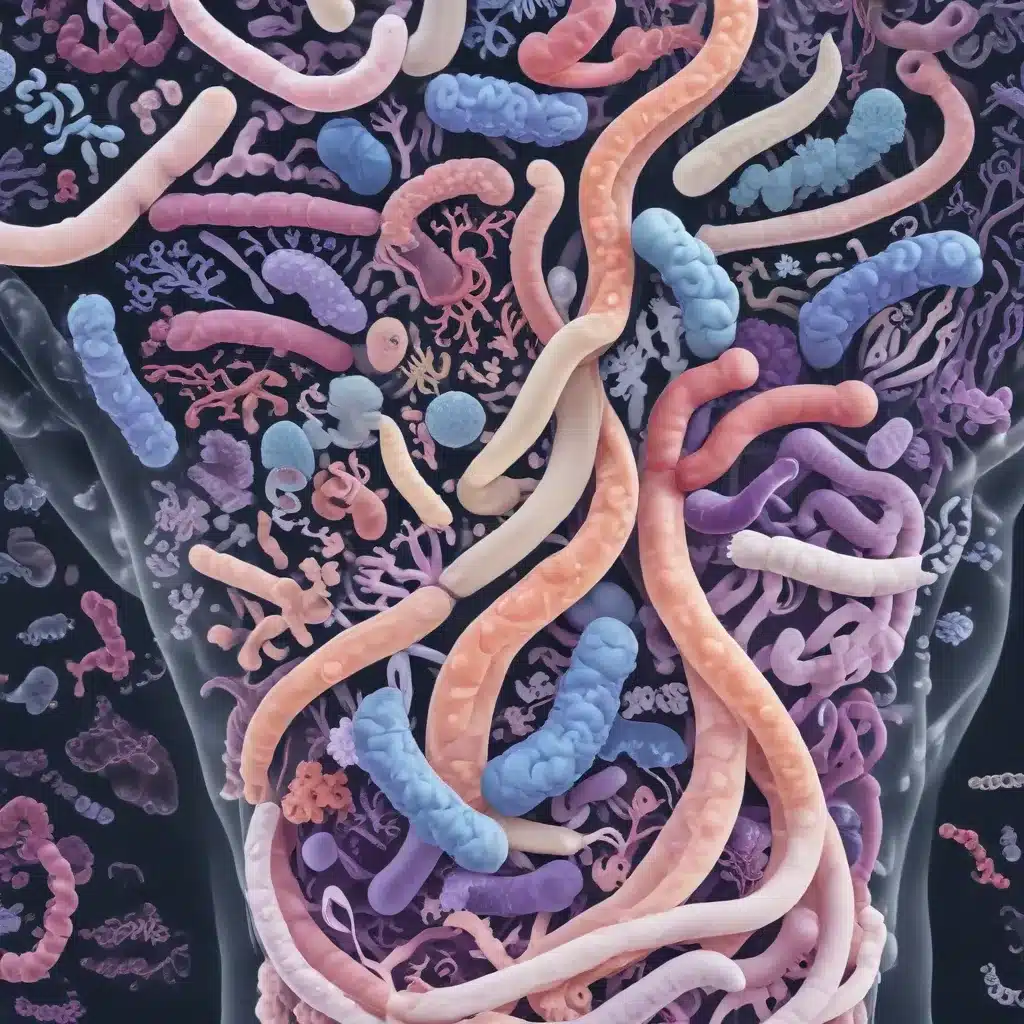
The Evolving Landscape of the Human Microbiome
The human microbiome has emerged as a central focus in modern biology and medicine. This diverse community of trillions of microorganisms, predominantly bacteria, that reside within our gastrointestinal tract plays a vital role in maintaining health and influencing the risk of numerous diseases.
Recent advances in sequencing technologies and computational analysis have revolutionized our understanding of the microbiome. Researchers can now characterize the composition and functional capabilities of the gut microbiome with unprecedented resolution. This has revealed remarkable inter-individual variability in microbiome configurations, shaped by a complex interplay of factors including diet, lifestyle, age, genetics, and environmental exposures.
Importantly, disruptions or imbalances in the gut microbiome, a condition known as dysbiosis, have been linked to a wide range of medical conditions, from inflammatory bowel diseases and metabolic disorders to neurological and autoimmune diseases. This has fueled intense interest in understanding the mechanistic links between the microbiome and human health, as well as exploring microbiome-based strategies for disease prevention and treatment.
Deciphering the Functional Roles of the Gut Microbiome
The gut microbiome is now recognized as a metabolic powerhouse, capable of breaking down otherwise indigestible dietary components and producing a diverse array of metabolites that can profoundly influence host physiology. These microbial metabolites have been shown to modulate immune function, gut barrier integrity, energy homeostasis, and even brain activity through the gut-brain axis.
For example, short-chain fatty acids (SCFAs) produced by the fermentation of dietary fiber by gut bacteria have been linked to anti-inflammatory effects, improved insulin sensitivity, and enhanced intestinal barrier function. Conversely, the gut microbiome can also generate potentially harmful metabolites, such as trimethylamine N-oxide (TMAO), which has been associated with increased risk of cardiovascular disease.
Beyond metabolism, the gut microbiome also plays a crucial role in shaping the host immune system. Commensal bacteria educate and regulate both innate and adaptive immune responses, promoting the development of tolerogenic regulatory T cells and maintaining intestinal homeostasis. Disruptions to this delicate host-microbe mutualism can contribute to the development of autoimmune and inflammatory disorders.
Intriguingly, the gut microbiome has also been implicated in the bidirectional communication between the intestines and the central nervous system, known as the gut-brain axis. Microbial metabolites and signaling molecules can influence neurological function, mood, and behavior, while the brain can also modulate the composition and activity of the gut microbiome through neural, endocrine, and immune pathways.
Therapeutic Opportunities Arising from Microbiome Research
The growing understanding of the gut microbiome’s influence on human health has sparked intense interest in developing microbiome-based interventions for a variety of medical conditions. Several promising approaches are currently being explored:
-
Probiotics and Prebiotics: The use of beneficial, health-promoting microorganisms (probiotics) and the dietary fibers that selectively nourish them (prebiotics) has shown promise in restoring gut microbial balance and alleviating symptoms associated with conditions like irritable bowel syndrome, inflammatory bowel disease, and antibiotic-associated diarrhea.
-
Fecal Microbiota Transplantation (FMT): This procedure, which involves the transfer of fecal material from a healthy donor to a recipient, has emerged as an effective treatment for recurrent Clostridioides difficile infection and is being investigated for other conditions, such as ulcerative colitis and metabolic disorders.
-
Targeted Manipulation of the Microbiome: Advances in synthetic biology and genome engineering are enabling the development of engineered probiotics and microbial consortia designed to perform specific functions, such as producing therapeutic metabolites or antagonizing pathogenic microbes.
-
Microbiome-Derived Therapeutics: Researchers are also exploring the potential of microbial metabolites, bacterial products, and microbial-derived small molecules as novel therapeutic agents for a range of conditions, including inflammatory, metabolic, and neurological disorders.
-
Microbiome-Informed Personalized Medicine: By understanding the unique composition and functional capabilities of an individual’s gut microbiome, clinicians may be able to develop personalized dietary, probiotic, or prebiotic interventions to optimize gut health and prevent or manage various diseases.
The Road Ahead: Challenges and Opportunities
While the field of microbiome research has made remarkable strides in recent years, there are still significant challenges that need to be addressed to fully harness the potential of the gut microbiome for improving human health.
Key challenges include:
– Establishing causality between microbiome alterations and disease states, rather than just observing associations
– Developing standardized methods for accurately measuring and characterizing the microbiome
– Understanding the complex interplay between the microbiome, host genetics, and environmental factors
– Overcoming regulatory and manufacturing hurdles for microbiome-based therapies
– Ensuring the safety and efficacy of microbiome interventions, particularly in vulnerable populations
Nonetheless, the future of microbiome research is bright, with ongoing advancements in multi-omics technologies, computational biology, and clinical research poised to unlock even deeper insights into the gut microbiome’s role in health and disease. As we continue to unravel the intricacies of this microbial ecosystem, we are likely to witness the emergence of innovative, microbiome-based strategies that can significantly improve patient outcomes and transform the landscape of modern medicine.
Conclusion
The human gut microbiome has emerged as a pivotal player in maintaining overall health and influencing the risk of a wide range of medical conditions. By deciphering the functional roles of this diverse microbial community and its complex interactions with the host, researchers are paving the way for the development of novel, microbiome-based interventions to prevent and treat a variety of diseases.
As the field of microbiome research continues to evolve, we can expect to see increasing integration of microbiome insights into clinical practice, enabling more personalized, targeted approaches to healthcare. While challenges remain, the tremendous potential of the gut microbiome to unlock new therapeutic opportunities is clear, and the future of this rapidly advancing field is full of promise.
To learn more about the latest developments in microbiome research and explore practical applications, I encourage you to visit the IT Fix blog for further in-depth coverage.












